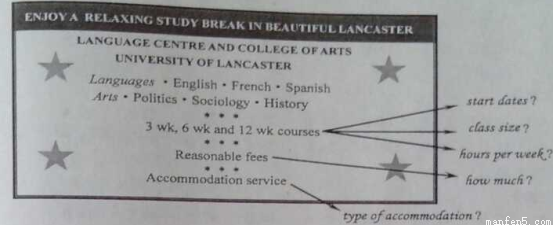题目内容
When our restaurant business failed,we headed north in a camping truck to Texas,hoping to have a “fresh start”.
At the of Palo Duro Canyon (峡谷)State Park,I a job advertisement hiring park hosts. The position offered a ,permanent campsite in the park, and , the hosts served as a link between the park’s guests and the rangers (护林人). It was the perfect solution: a rent-free place to reorganize our lives. We entered the park and I made an for the following day.
The park was , so it took us some time to find an available site. That evening, as we finished our dinner, my wife saw two large skunks (臭鼠由)walking toward our table. We climbed onto the table and, for the next four hours, waited for them to our camp.
Having survived that night, we were that everything else would be all right. The next day we met with the people who ran the park. They explained our and gave us a beautiful campsite.
That evening, , we learned about the canyon . They were strong and cold, rocking our little camping truck violently,and we lay in the dark until the winds died away.
the weeks that followed, we learned to survive in our truck and the little money my wife by substitute teaching. Building a successful business and then losing it had left very little time for building a successful For a time after our business I thought I might lose my family as well.
Living in the tiny with no television, we sat close together reading and talking. One evening, standing under a jeweled sky,I found myself for all the hardships. We had walked the trails and climbed the canyon walls. We had become a family!
1.A. backB.edgeC. centreD. entrance
2.A. sponsoredB. publishedC. noticedD. answered
3.A. safeB. freeC. convenientD. beautiful
4.A. in returnB. in timeC. in shortD. in turn
5.A. attemptB. agreementC. appealD. appointmei
6.A. crowdedB. dangerousC. idealD. quiet
7.A. repeatedlyB. immediatelyC. eventuallyD. calmly
8.A. attackB.leaveC. passD. search
9.A. satisfiedB. determinedC. confidentD. aware
10.A. responsibilitiesB. requirementsC. circumstancesD. conditions
11.A. moreoverB. thereforeC. meanwhileD. however
12.A. windsB. snowsC. woodsD. trails
13.A. shakingB. quarrellingC. mourningD. aching
14.A. AfterB. BetweenC. DuringD. Beyond
15.A. give awayB. hand outC. live onD. put aside
16.A. borrowedB. earnedC. postedD. raised
17.A. businessB. careerC. familyD. image
18.A. startedB. failedC.expandedD. declined
19.A. truckB. parkC. houseD. camp
20.A. desperateB. readyC. suitableD. thankful
1.D
2.C
3.B
4.A
5.D
6.A
7.B
8.B
9.C
10.A
11.D
12.A
13.A
14.C
15.C
16.B
17.C
18.B
19.A
20.D
【解析】
【文章大意】本文是一篇记叙文。作者在生意失败后和妻子一起前往Texas希望能有一个新的开始。在帕罗杜洛峡谷州立公园找到一份作为护林人的工作,通过在此期间生活经历的种种深悟家庭的重要,也顺利地从生意失败的阴影中走出,勇敢地面对生活。
1.及语境理解。此段的最后有“We entered the park and…”可知我们走进公园,所以一开始是在入口处。A 后面;B 边缘;C 中央;D 入口。
2. 动词辨析及语境理解。空格后面是一工作广告,所以是作者看见,注意到。A是“赞助”;B“出版”;D“回答”
3.及语境理解。后面有“a rent-free place…”,所以这儿直接用 “free”表“免费的”。
4. 介词短语辨析及语境理解。句意上这儿需要的是“公园提供免费的永久的露营地但需要做相应的工作”。A项“作为回报”适合;B “及时”;C简短;D “ 轮流,反过来”。
5. 名词辨析与搭配及语境理解。根据下文作者是应征了这份工作并对于接下来的生活有了自己的计划安排。这儿考的是形近词的辨析,A表示“尝试”;B “同意”;C “吸引”;D是“安排,计划”在这类似于“plan”与前面的“make”搭配使用。
6. 形容词辨析及语境理解。根据后面的内容“so it took us some time to find an available site ”表示“我们花了一段时间找到合适的地方”所以A “拥挤的”适合。B表示“危险的”;C是“理想的”;D是“安静的”。
7. 副词辨析及语境理解。根据前面的内容,有臭鼬过来人是吓的立即爬上了桌子,所以B“立刻地”适合。A表示“重复地”;C表示“最终地”;D是“镇定地”。
8. 动词辨析及语境理解。根据上文是吓得爬上桌子几个小时所以是等臭鼬离开。A表示“攻击”;C是“经过”;D是“搜寻”之意。
9.形容词辨析及语境理解。根据句意,经过了一晚上除了臭鼬的事情没有别的事,所以是感觉其它的都好,只有C符合。A表示“满意的”;B是“意志坚定的”;D是“意识到”。
10. 名词辨析及语境理解。根据上文人们向我们阐述我们所要承担的什么样的责任或任务。B是“要求”;C是“状况”;D是“条件”。
11.上下文串联及语境理解。前面刚提到“a beautiful campsite”,后面出现了冰冷的寒风,所以这儿是转折的概念。A表示递进;B表示因果;C表示并列。
12.名词辨析及语境理解。下文有“until the winds died away.”,属于上下文原词一栏。D是“小径,小道”的意思。
13. 动词辨析及语境理解。根据上下文冰冷的暴风刮了一夜,所以我们躺的地方一直是摇摇晃晃的感觉。B表示“争吵”;C是“哀悼”之意;D是“疼痛”。
14. 介词搭配及语境理解。句意上在接下来的几个星期内,所以应该是C项的During;D表示“超越”之意。
15. 短语辨析及语境理解。上下文来看是关于用钱的问题,指得是靠不多的钱生活。A表示“捐赠,泄露”;B是“交出”之意;C是“以…为生”;D表示“放在一旁”。
16. 动词辨析及语境理解。与money的搭配是make或earn,这儿指的是妻子挣到的钱。A表示“借”;C是“张贴”而D是“抚养,筹集,举起”之意。下文有“by substitute teaching”,所以应该是挣钱。
17. 名词辨析及语境理解。根据文章最后作者表达的最终建立家庭的情况来看,这儿只能用family,上下对应。A是”生意“;B是 “事业”;D表示的是“形象”。
18. 动词辨析及语境理解。根据文章一开始作者介绍的背景知道是生意上的失败。A表示“开始”;C是“扩大”之意;D是“下降,拒绝”。
19. 名词辨析及语境理解。上文一直在提到是在我们的卡车里,所以这儿是作者对于这样生活的感受。
20. 形容词辨析及语境理解。作者最后对于这样行的生活有感而发,虽然生意失败了,但是却给了作者一个温暖的家,所以这儿的情感更是对困难的一种感激与敬意。A表示“绝望”;B是“准备好了”C表示“适合的”。
考点:考查记叙文完形填空

